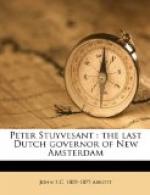“The women and children lay concealed in straw huts, while their husbands and fathers mounted guard on the crumbling ramparts above. For the fort itself was almost defenceless. It resembled rather a mole-hill than a fortress against an enemy. The cattle, which had escaped destruction, were huddled within the walls, and were already beginning to starve for want of forage. It was indispensable to maintain a constant guard at all hours, for seven allied tribes, well supplied with muskets, powder and ball, which they had procured from private traders, boldly threatened to attack the dilapidated citadel with all their strength, now amounting to fifteen hundred men.
“So confident had the enemy become, that their scouting parties constantly threatened the advanced sentinels of the garrison. Ensign Van Dyck, while relieving guard at one of the outposts, was wounded by a musket ball in his arm. All the forces that the Dutch could now muster, besides the fifty or sixty soldiers in garrison, were about two hundred freemen. With this handful of men was New Netherland to be defended against the implacable fury of her savage foe.”
For a time the war which had desolated the region of the lower valley of the Hudson, did not reach fort Nassau, now Albany. The tribes resident there were at war with the lower river tribes. As these Indians still maintained apparently friendly relations with the whites, the patroon, Van Rensselaer, allowed his agents freely to sell to them fire arms and powder.
This distant and feeble post at this time consisted only of a wretched little fort built of logs, with eight or ten small cannon or swivels.
A hamlet of about thirty huts was scattered along the river. A church, thirty-four feet long by nineteen wide, had been erected in a pine grove within range of the guns of the fort. Nine benches accommodated the congregation. A very faithful pastor, Domine Megapolensis, ministered to them.
The red men were often attracted to the church to hear the preached gospel, and wondered what it meant. Megapolensis writes:
“When we have a sermon sometimes ten or twelve of the Indians will attend, each having in his mouth a long tobacco pipe made by himself, and will stand awhile and look. Afterwards they will ask me what I was doing, and what I wanted, that I stood there alone and made so many words and none of the rest might speak.
“I tell them that I admonish the Christians that they must not steal or drink, or commit murder, or do anything wrong, and that I intend, after a while, to come and preach to them when I am acquainted with their language. They say that I do well in teaching the christians, but immediately add, ’Why do so many christians do these things?’”
This was several years before John Eliot commenced preaching the gospel to the Indians near Boston. Kieft very earnestly applied to the English colony at New Haven for assistance against the Indians. The proposal was submitted to the General Court. After mature deliberation, it was decided that the Articles of Confederation between the New England colonies prohibited them from engaging separately in war; and that moreover “they were not satisfied that the Dutch war with the Indians was just.”




